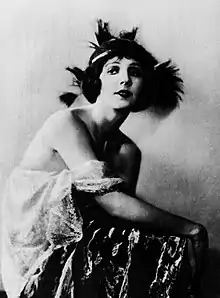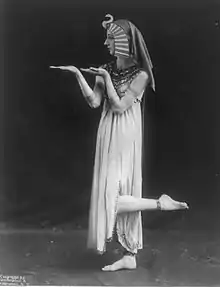Desiree Lubovska
Desiree Lubovska (June 21, 1893 — 1974), also seen as Desiree Lubowska, was the professional name of American dancer Winniefred Foote.


Early life
Winniefred Foote was born in Faribault, Minnesota. She changed her name, adopted an accent in her speech,[1] and created a backstory of dancing in Russia; she also said that she studied Egyptian art at the British Museum and became convinced that "angles, sharp corners, such as we find on the ancient tablets of Egypt, where lovely Egyptian women of the early day are portrayed, are only beautiful." She went on a diet and fitness regimen in pursuit of a more angular physique, and her dances reflect this focus. "I finally felt I was one of them, a reincarnated spirit of the Nile."[2]
Career
Lubovska started the short-lived but ambitious[3] National American Ballet company in 1921.[4][5] The national ballet program was housed on a farm in Hightstown, New Jersey.[6] The school was later relocated to Arlington, Virginia, with her mother Blanche E. Foote as the school's business manager.[7]
In 1918 Lubovska appeared as "Night" in the "musical spectacle" Everything with music by Irving Berlin and Philip Sousa, at the Hippodrome in New York.[8] Also at the Hippodrome, in 1920, she danced at a benefit for the Serbian Child Welfare Association.[9] In 1921, Lubovka sued V. Vivaudou, an American talcum powder manufacturer, for using an image of her "in scant attire" in a newspaper advertisement.[10][11] That year, she danced at the International Silk Exposition in New York, embodying "The Spirit of Silk", beginning with a burst from a cocoon.[12] Also in 1921 she danced at meetings of the National Garment Retailers' Association[13] and the New York League of Advertising Women, performing at the latter "a satire on modes and manners."[14] In 1922 she was touring in South America.[15]
She appears in the silent film Greater Than Fame (1920).
Personal life
Desiree Lubovska had a son, Joseph Willard Schutz, born in 1912.[16] She died in 1974, aged 80 years.
References
- "Girl Dancer Who Posed as Russian to Gain Fame, in Tampa for Ballet Recruits" Tampa Tribune (April 27, 1926): 13. via Newspapers.com

- Helen Hoffman, "Society Now on its Toes" South Bend News-Times (April 20, 1921): 12. via Hoosier State Chronicles

- "Dancer Leads Movement for National Ballet" Houston Post (July 10, 1921): 31. via Newspapers.com

- "Want American Ballet" The New York Times (February 26, 1921): 10.
- "Mme. Lubovska to Found a National Ballet to Train Dancers" Musical America (February 19, 1921): 2.
- Hannah Mitchell, "Social Leaders Back Plan for American Ballet School" New-York Tribune (February 20, 1921): 68. via Newspapers.com

- "American Ballet Trains in South; to Tour Country" Arizona Daily Star (September 6, 1925): 7. via Newspapers.com

- "Hippodrome" Theatre Magazine (October 1918): 212.
- "Serbian Child Aid Party" The New York Times (May 31, 1920): 10. via ProQuest
- "Trade Notes" American Perfumer (August 1921): 256.
- "Dancer Sues for 100,000" New-York Tribune (August 2, 1921): 5. via Newspapers.com

- "'Silk Week' Climax of Show" Textile World (January 29, 1921): 25.
- "The Spring Fashion Fete at the Hotel Commodore" American Cloak and Suit Review (February 1921): 145-146.
- "New York Ad Women Hold Brilliant Ball" Editor and Publisher (March 19, 1921): 14.
- "Lubovska, Dancer, Wins Plaudits" The New York Times (May 14, 1922): 26. via ProQuest
- Bill Thayer, "Names from the Past".
External links
- Desiree Lubovska, "The Public and the Artist" Theatre Magazine (November 1918): 294.
- A 1924 photograph of Desiree Lubovska wearing a Lanvin gown, by Edward Steichen for Vogue, at Getty Images.
- Another 1924 photograph of Desiree Lubovska, wearing a gown by Bendel, by Edward Steichen for Vogue, at Conde Nast.